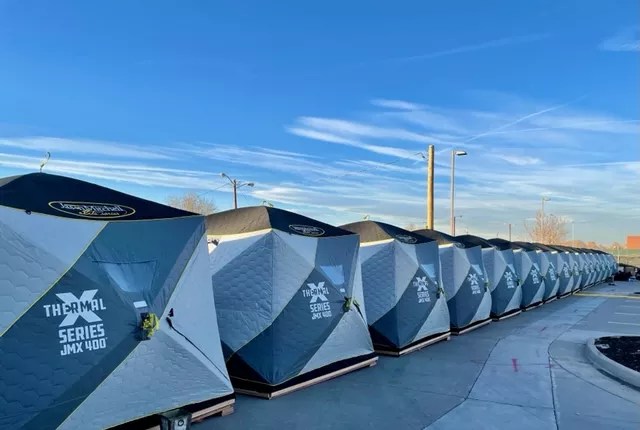
Courtesy of Jennifer Forker

Audio By Carbonatix
Three people who opposed the establishment of a safe-camping site in the Clayton neighborhood have withdrawn the appeal they’d filed with the city seeking a revocation of the site’s permit.
“[Safe outdoor space] encampments have become one of the highest forms of enablement for this at-risk population and are failing in every city where they have been used. We need to give our fellow citizens in need a hand up – not a handout,” Michael Kennedy, one of the three appellants, wrote in an April 18 letter to the Denver Board of Adjustment for Zoning Appeals, withdrawing the administrative appeal for the site at 3815 Steele Street. As a result, the Board of Adjustment has canceled its hearing scheduled for April 19, which would have determined whether Denver zoning administrator Tina Axelrad erred when issuing a permit for the site.
Since December 2020, nonprofit organizations, most often the Colorado Village Collaborative, have run safe-camping sites in Denver designed as a bridge between unsheltered homelessness and permanent housing; they are equipped with uniform ice-fishing tents and offer centralized access to sanitation and services. Currently, there are safe-camping sites on the campus of Regis University, on a parking lot owned by Denver Health at 780 Elati Street, and in the parking lot next to the Denver Human Services building at 3815 Steele Street.
Since the first such site was founded in December 2020, they’ve become popular among elected officials, city bureaucrats, homeless-rights advocates and other Denver residents who view the sites as a more humane and cleaner alternative to unsanctioned encampments. But the program has also faced opposition from the start, particularly in South Park Hill, where a handful of neighbors filed administrative appeals and a lawsuit to block a site in the parking lot next to Park Hill United Methodist Church. The appeals failed, as did the lawsuit, and the safe-camping site was able to finish out its lease on the property.
Kennedy, together with Robert Reich and Robert Manning, filed an appeal in December as KRMN Steele, LLC, an entity that had previously expressed a desire to rezone properties owned by the three appellants in the Clayton neighborhood. Kennedy and Reich signed the April 18 letter noting the withdrawal of their appeal, but Manning did not. In his place was Ryan Neville, a Denver real estate professional who works as a principal with KRMN Investments.
Kennedy, Reich, Manning and Neville did not respond to interview requests. In the April 18 letter, however, they explained that they were withdrawing the appeal because of a unanimous Board of Adjustment vote on April 5 to reject an appeal of the safe-camping site at 780 Elati Street filed by dozens of neighbors.
“Based on the facts of the Elati appeal and in speaking with its appellants, it is apparent that the Zoning Administrator, by way of decision, continues to ignore the true risks and dangers to the communities posed by the SOS encampments,” the Steele Street appellants wrote in the April 18 letter. “The fact that the Board would ignore wisdom, legality, and neighbors’ due-process rights in such a crucial decision is almost as much absurd as it is obnoxious.”
Like the neighbors in the Elati Street case, the Steele Street appellants highlighted their concerns that the current safe-camping sites, which are overseen by the Colorado Village Collaborative, do not prohibit people with convictions for sexual offenses from becoming residents, nor do they require background checks. The Steele Street appellants also took issue with the fact that residents of the safe-camping sites are able to participate in a needle-exchange program.
According to the CVC, criminal background checks and sex-offender screenings would have a disproportionately negative impact on Black, Indigenous and other people of color.The CVC prohibits the use of alcohol and drugs at the camps, but staffers also employ a “harm reduction approach” when dealing with a resident found using alcohol or drugs on site. Even so, the CVC says it has kicked out residents for rule violations.
CVC executive director Cole Chandler says that the organization is “thrilled” by the withdrawal of the Steele Street appeal.
“Clearly the board has set a strong precedent in voting three times to uphold the decision of the Zoning Administrator. We stand on firm footing to move forward in our daily operation and expansion of these critical services. So far in 2022, 175 people have been served through Safe Outdoor Spaces, 19 of whom have graduated from the program into longer-term housing options,” Chandler says. “It is long past time to leave behind the divisive and unpopular rhetoric opposing services for our unsheltered neighbors and lean forward into a transformative future where we support those who are suffering in our midst. Denver is at a critical juncture in its housing and homelessness crisis. We simply can’t afford to choose to do otherwise any longer.”
But while it hasn’t booted any safe-camping sites, the board has listened to neighbors. During the April 5 hearing, boardmembers said that they’d like to see a better process for issuing permits, one that takes the concerns of neighbors into account.